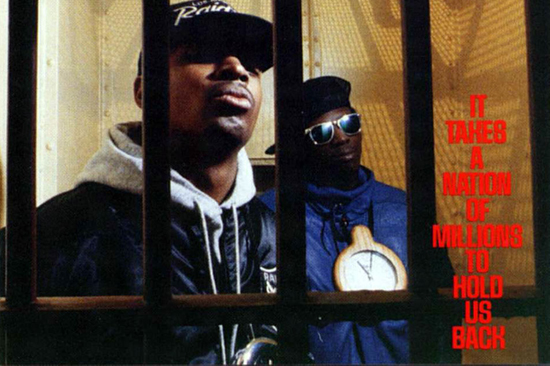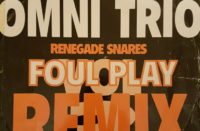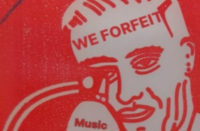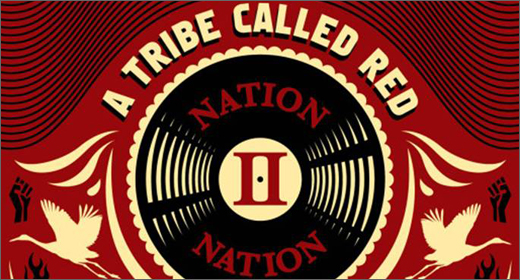Public Enemy broke new ground both sonically and in their attitude. They brought a political message to Hip-Hop that was coherent, personal and well reasoned. This had been done before of course, Hip-Hop is a cultural political art form with roots that stretch back to a time when the terrible mis-treatment of fellow human beings was acceptable (imagine that!).
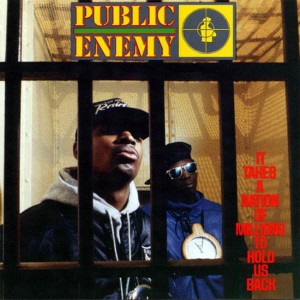
[September 2011] I think everyone has at least one really special record in their collection. A record that will always make it into your top five of all time list. A record that is irrevocably linked to and maybe even part of a significant period in its owners life. For me, that record is Public Enemy’s seminal second album, the snappily titled It Takes A Nation Of Millions To Hold Us Back (Def Jam, 1988). It has since gained an almost spiritual status for me, and when I hear people dismiss it, as occasionally happens, I feel a deep and disproportional sense of outrage that someone can have paid so little attention to what was one of the most important things ever to happen. This album offered me a new way of perceiving the world, initiated my first glimmers of political awareness, and opened the doors on a whole new world of possibility for what music could be and do. It thrilled me, it gave me goosebumps and changed everything.
I first heard this album when I was about fourteen years old, and the impact it had on me cannot be overstated. As a young lad in rural England with foreign lineage, I was always slightly on the outskirts of the community, slightly separate from everyone else. Not that this really bothered me, but when I heard It Takes A Nation Of Millions, I instantly felt like I had a conspirator. This was a voice that spoke to me, almost exclusively in my little village. It is a politically charged album, filled with the outrage of the American black civil rights movement, and delivered with piercing directness. But yet it was accessible to anyone who was willing to listen, the message was pro black, but not to the exclusion of us white folk who were sympathetic to what was being said.
I don’t think the lyrical content even sunk in initially, the music was so powerful and unashamed of itself, defiant in its chaos, like a challenge to the rest of the world. It was completely different to anything I had heard before; dense, chaotic, direct and brutal, but above all, the sounds themselves were completely new and original, built as they were from densely layered samples, drum machines, musique concréte and bass-lines that colluded to make something akin to a Spectre-like wall of sound. The samples themselves tapped into the lineage of black history and were subsequently loaded with meaning; the message of the music was built into the very fabric of the beats. And then there was the vocal delivery of Chuck D! There was something about the way he spat his rhymes that fascinated me to the point where I felt compelled to read all the lyrics on the record sleeve, not just once or twice, but incessantly until I knew all the words and grasped as many of the references as I could. He was not the slickest MC, nor did he have the best flow, but he had a fierce intellect and a lot to say. He put so much information into his rhymes, and had a very powerful style – Hank Shocklee (producer and member of the Bomb Squad) once said:
“Chuck’s a powerful rapper. We wanted to make something that could sonically stand up to him.” (Hank Shocklee on Chuck D)
The fact that he was referencing all these people and incidents that I had never heard of gave me a desire to find out about them, which in turn had a great bearing on my political and social views then and now. The seriousness of Chuck D was balanced by the often nonsensical iterations of Flava Flav, which managed to level things out and keep the album on the right side of seriousness. He was the side man to Chuck’s intensity. This album represents the point in my life where I simultaneously started to become politically aware of the world, and started to gain a sense of having my own identity. Yes, this is a very important record to me, the first one to blow my mind.
The production style that was adopted by Hank Shocklee and the Bomb Squad for It Takes A Nation Of Millions has since been recognized as groundbreaking, and much has been said and written about it over the last twenty three years. I still think it is one of the most innovative productions that I have ever heard, and even now I find bits on it that I hadn’t noticed before, or that resonate in a new way, or even bits that suddenly make sense after twenty odd years of ruminating on. With It Takes A Nation Of Millions, Public Enemy made huge leaps in terms of production and carried the tradition of using the legacy of black artists as elements in the construction of their music to a whole new level. Now not only were they using James Brown breaks, but they were delving into the whole gamut of black history with the likes of John Coltrane, Charlie Parker, Gill Scott Heron, Malcolm X, Louis Farrakhan and so on. More then this though, was the way these samples were used, tiny segments of samples stabbed repeatedly, saxophone riffs played from half way through the lick and looped, parts of Malcolm X speeches edited to bring out new meanings (the words “too black, too strong” are never far away from my internal record player), James Brown beats chopped up or triggered by hand to create varying rhythmic attacks – it was dense and disorienting. As well as reusing and highlighting previous black artistry in their sampling, this album included a notable intake of white culture too with bands like Slayer and Anthrax being brought into the sampling palette. Public Enemy adopted some of the ethos of a rock or punk band, in a similar way to Run DMC, but with more franticness. Great emphasis was placed on live shows, which was the initial reason for the generally increased tempo of the album compared to their debut Yo! Bum Rush The Show. They were later to break down many barriers between Hip-Hop and rock cultures with, for example the collaboration with Anthrax on “Bring the Noise.” Again, this is an accolade which has to be shared with Run DMC.
Public Enemy broke new ground both sonically and in their attitude. They brought a political message to Hip-Hop that was coherent, personal and well reasoned. This had been done before of course, Hip-Hop is a cultural political art form with roots that stretch back to a time when the terrible mis-treatment of fellow human beings was acceptable (imagine that!). KRS1, Grand Master Flash and many others had very political or conscious lyrics, but Public Enemy managed to use sounds and words as a combined force. “An important message should have its importance embedded into the way it’s relayed,” Chuck once explained. “You hear Public Enemy, you hear a tone that says ‘Look out! This is some serious shit coming!‘”.
Public Enemy may not have had the smoothest flow, or the most accessible beats compared to their contemporaries, but they had a unity, a very clear ethos and a bravery that expanded horizons and laid the foundations for future musicians willing to put their money where their mouth is. Rage Against The Machine, Dead Prez, Consolidated, Meat Beat Manifesto, Fun-Da-Mental, DJ Shadow and, well, many many others owe a lot to Public Enemy, and specifically this album. Always in my top five list, usually at the top.
For more about Public Enemy, visit their website at publicenemy.com.






